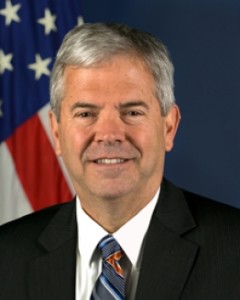

Richard McKinney, the Transportation Department CIO, said he signed a memo along with the CFO and an assistant secretary to require bureau level CIOs to submit IT...
The Transportation Department stopped any new technology buys until it had an inventory of its current IT.
That was one of DoT’s first steps to implementing the Federal IT Acquisition Reform Act (FITARA).
Richard McKinney, Transportation’s chief information officer, said the freeze was an initial step to bring the acquisition, budget and technology offices closer together.
“We put out a memo and we asked the modal CIOs to take their IT budget and translate into an IT spend. Line-by-line, show us how they were going to spend their money,” McKinney said in an interview during the ACT-IAC Management of Change conference in Cambridge, Maryland. “We thought that will surface all the things I would need to know about. It would help me uncover places where perhaps there is duplicative spend in the department. If I could approve that modal IT spend plan, then they could be free to do the mechanical execution against that spend plan.”

McKinney said the goal with the memo was to figure out how best to implement the part of FITARA that gives him the authority to approve all IT spending. He said if he waits until the purchase requisition is on his desk to sign off, then it’s too late.
“I really should be in on the discussion on the whole concept of what is being procured [as it] was taking place and those plans were being formulated,” he said.
DoT Assistant Secretary for Administration Jeff Marootian and Chief Financial Officer Shoshana Lew also signed off on the memo, McKinney said. He said the memo had six or seven different iterations as he received input from the bureau CIOs as well as the acquisition and budget executives.
McKinney said the final version of the memo went across the department in late April or early May.
“I went into it thinking I’ve got to make FITARA real. I became very aware that at some point someone was going to hold me accountable if we went out and bought something and then someone, let’s say the Hill, asked me if I bought XYZ and I didn’t know about that. That wouldn’t be a good answer. That conversation wouldn’t end well for me or the department. I thought what we were doing was the responsible thing to do,” McKinney said. “The other thing that I’m totally convinced of is there was IT spend in our department that even was taking place outside the knowledge of the modal CIO. So by forcing this conversation I would be in a better place and have better visibility but so would the modal CIO, and that would then generate good conversations between us as we figure out how to move forward together.”
He said several of the modal CIOs have turned in their spend plans, and he’s held meetings with those bureaus to talk through strategies.
Going forward, DoT’s policy will require the bureau CIOs to develop spending plans within 60 days of Congress and the President approving that year’s budget.
McKinney said the idea of an IT spend plan is modeled, at least in part, from something another modal had been doing for several years.
“We circulated that as an example,” he said. “We asked them to file their plan anyway they want and over the next year maybe we can come to a consensus of what that best practice is. Right now, we are taking anyway they want to put it together.”
Along with the spending plans, McKinney said DoT’s FITARA implementation also will focus on his role in the budget formulation process as well as his role in hiring new CIOs in the bureaus.
“What we put in our implementation plan is rather than the operating administration pick a new CIO and then at the very end I get to give it a thumbs up or thumbs down, I would just be a part of the final interview process so we could come to a consensus about a candidate for this opening and that way I wouldn’t be sitting in judgement after the fact,” he said.
McKinney said overall he believes there is a recognition of his role under FITARA and the fact Congress will hold him and other CIOs accountable.
He said DoT’s progress in implementing FITARA comes up in conversations with Secretary Anthony Foxx and Deputy Secretary Victor Mendez all the time.
“I feel like we understand FITARA is meant to strengthen the entire department and strengthen the relationships between my office and acquisition, and the chief human capital officer and the CFO,” McKinney said. “We always had a good relationship, but it’s really strengthened the dialogue and the frequency of our conversations is much greater.”
Copyright © 2024 Federal News Network. All rights reserved. This website is not intended for users located within the European Economic Area.
Jason Miller is executive editor of Federal News Network and directs news coverage on the people, policy and programs of the federal government.
Follow @jmillerWFED

